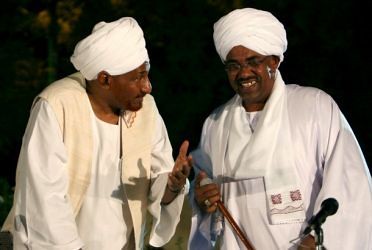
Sudan President Omar Hassan al-Bashir in dialogue with former prime minister and Umma Party leader al-Sadiq al-Mahadi. The Umma Party has broken off discussions., a photo by Pan-African News Wire File Photos on Flickr.
Sudan Ruling Party Chides Opposition for Ending Dialogue
October 3, 2011
(KHARTOUM) – The ruling National Congress Party (NCP) in Sudan has criticized the opposition National Umma Party (NUP) for its unilateral decision to end their dialogue, saying such action was “unacceptable.”
The NCP has been seeking to defuse tension in Sudan’s political arena by bringing the NUP of former Prime Minister Al-Sadiq al-Mahdi and the Democratic Unionist Party (DUP) of Mohamed Osman Al-Mirghani, the biggest parties in the opposition’s coalition, to join the new government the party intends to form following the breakup of the country with South Sudan’s secession in July.
However, the NCP excluded other opposition parties, particularly the Popular Congress Party (PCP) of the Islamist leader Hassan al-Turabi and the Sudanese Communist Party (SCP), both of which reject participation in the government and remain committed – at least publicly - to overthrowing the NCP which they accuse of a long list of failures.
Whereas the DUP has remained conspicuously silent on the progress of its difficult dialogue with the ruling party, the NUP reported in April that agreements had been reached on some issues and failed on others.
The NUP leader al-Mahdi has long defended his decision to engage in dialogue with the NCP, warning that the option of toppling the government through revolts could replicate the violent scenarios of Libya and Yemen.
He also said that his party was negotiating on the basis of "national agendas" which include reviewing the system of governance, building good relations with the new state in South Sudan, public liberties, the economic situation and realistic approach to the issue of the International Criminal Court (ICC) which issued an arrest warrant for president Al-Bashir on charges stemming from the conflict in the western region of Darfur.
On Sunday, the NUP ended months of speculations on its possible participation in the government, issuing a statement announcing the obituary of the talks with NCP and saying that its participation in the government must be on the basis of the national agendas.
The NUP further said it would resort to the option of "civil disobedience" in order to establish a new system that meets the legitimate aspiration of the Sudanese people.
Reacting to this, the NCP’s media secretary Yasir Youssef on Monday said that ending the dialogue in this manner was “unacceptable,” adding that it should have been done through a joint statement not through a unilateral statement in respect of the agreements reached on many issues.
He further regretted the NUP’s threat to resort to civil disobedience, saying that political parties should observe civilized manners and engage in the dialogue over a permanent constitution that carries guarantees for free and fair elections.
Youssef further stressed that his party was committed to engaging all political parties in discussions about the constitution as well as invitation to join the government despite the fact that the current government was voted into power by the Sudanese people.
The NCP maintains a claim of legitimacy arising from the results of the 2010 elections which were marred by reports of fraud and boycotted by all political parties except the PCP and the DUP.
The elections gave the NCP a near total victory in the parliament and president Al-Bashir was declared winner of the presidential vote.
In August, however, the NCP hinted at the possibility of organizing early elections, saying that a growing number of the party’s supporters believe such vote is vital to unify national ranks and offer concessions for rapprochement with opposition parties.
(ST)
No comments:
Post a Comment